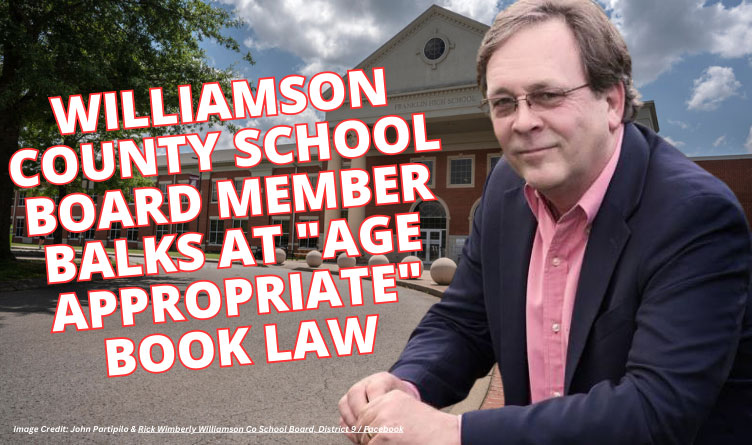New measure increases focus on sex, violence in school materials. A member of the Williamson County School Board is pushing back on an updated law regulating school library books.
Image: Franklin High School & Rick Wimberly Image Credit: John Partipilo & Rick Wimberly Williamson Co School Board, District 9 / Facebook
By Sam Stockard [The Tennessee Lookout -CC BY-NC-ND 4.0] –
A Williamson County School Board member is questioning the state’s updated law on “age appropriate” school books, calling it an unfunded mandate and likely unconstitutional.
Board member Rick Wimberly, who is not seeking re-election after 13 years, told the Tennessee Lookout that as the Williamson County board tries to adhere to the law, it is finding the measure “impractical.” He made calculations showing if librarians spend 15 minutes each on just 15% of the district’s 600,000 selections, it would take up 30% of their time for the year.
“It’s quite cumbersome, and as our lawyers say, it’s constitutionally suspect. … It’s pretty clear that it is,” Wimberly said.
He expects the law to be challenged in court, even though the Williamson County School Board is trying to put together a policy to meet the requirements.

The House initially approved the bill in April 2023, and Gov. Bill Lee signed the measure sponsored by Republican Rep. Susan Lynn of Mt. Juliet and Republican Sen. Joey Hensley of Hohenwald on April 23 after the House passed amendments adopted by the Senate in March.
The new law is more stringent than the measure passed in 2022 because it targets materials that “in whole or in part” contain nudity or descriptions or depictions of sexual excitement, sexual conduct, excess violence, or sadomasochistic abuse and are inappropriate for students in K-12 schools. Items deemed “patently offensive” or that appeal to “prurient interest” for age and maturity levels won’t be allowed either.
Schools are required to keep a list of all materials in the library and post it on their website, and school boards must set a policy for reviewing books and other library items.
If a parent raises questions about a book or library material, the school board is required to evaluate the item within 60 days and decide whether it’s appropriate for students who have access to it. Otherwise, a parent or guardian can ask the state’s textbook and instructional materials quality commission to evaluate the item.
These challenges, which have been made in several districts statewide, can lead to removal of books and other materials from libraries. The McMinn County School Board in East Tennessee banned the Pulitzer Prize winning novel, “Maus,” in 2022, a Holocaust-based novel that contains a drawing of a nude woman and contains “inappropriate language.”
Critics of the law contend some items approved this year as Tennessee’s official books, such as the Bible and “Roots,” the classic novel written by Alex Haley about his ancestors’ life in slavery, could be removed from school libraries because they are filled with sex and violence.
Lynn, though, scoffed at opposition, saying the bill requires only that “sexually explicit” books must be removed.
“It’s a pity they feel there are so many sexually explicit books in their library that it’s gonna be an unfunded mandate for them,” Lynn said.
She contended libraries containing “sexually explicit” books are an “insult to taxpayers.”
“It’s shocking they would have such a struggle with this new law, but I guess that’s why we need it,” she added.
The veteran Republican lawmaker initially said in an interview the law doesn’t deal with books that contain “violence,” although it specifically pinpoints “excess violence.” She added, however, that the new law should “clear up a lot of problems” and said it should ensure schools have a “wholesome environment where anybody could look at the library books and not be embarrassed.”
House Speaker Cameron Sexton defended the bill that passed in 2022, at one point asking reporters to read portions of “Me, Earl and the Dying Girl,” a story about a teen boy who befriends a girl suffering from cancer. The book contains some graphic words, and Sexton said books with that type of language shouldn’t be allowed in school libraries.

Opponents of the legislation argued this year that the updated law, which bounced off a bill proposed by Gov. Lee, is a form of book banning that could put the Bible at risk for “censure.”
After meeting with a group of librarians this session, Democratic state Sen. Heidi Campbell said she’s worried the new law could force librarians to clear their shelves because the law could affect more books. The bill’s language was changed to deal with selections that contain sexual references, nudity or violence “in whole or in part.”
Campbell is concerned changes in the law are putting Tennessee in the same category as dictators who burned and banned books over the course of history.
“It’s a terrible idea, and I think it’s very unfortunate that we’re putting our librarians and teachers in a position where they’re having to work so hard to figure out how they need to interpret this kind of legislation,” she said.
Democratic Rep. Sam McKenzie of Knoxville also believes the new law goes too far and accuses Republican lawmakers of being “hell-bent” on clearing libraries of any books they don’t like.
“These are paranoid people that are doing way too much. We have to teach our children to think, to discern, think at a higher level,” McKenzie said.
Defining “inappropriate” books and materials is difficult, he said, and while a third-grader might not be mature enough to read “Roots” or “Huckleberry Finn,” a high school student should be able to handle it.


About the Author: Sam Stockard is a veteran Tennessee reporter and editor, having written for the Daily News Journal in Murfreesboro, where he served as lead editor when the paper won an award for being the state’s best Sunday newspaper two years in a row. He has led the Capitol Hill bureau for The Daily Memphian. His awards include Best Single Editorial from the Tennessee Press Association. Follow Stockard on Twitter @StockardSam




4 Responses
Wimberly is a Leftist. I’m not kidding.
Focus on the books that teach first graders about sex and make the rest low priorities.
No one expects them to ban Roots. If the Lobs want it banned, let them complain.
A Leftist and a groomer.
Too many politicians forget they are Representatives of the people -not Princes. They are supposed to vote for an on behalf of, the citizens who elected them -not to vote their personal opinions!
Susan Lynn is correct, it is a travesty that those who fight against this law, like Rick Wimberly and Heidi Campbell, both liberals from the same cloth, feel that the ‘state’ needs to provide these books with such desperate violence, and deviant and explicit sexual material and content using taxpayer dollars! When, we all know, every single one of these students has immediate access to any book they want in a hot minute on some web- based internet site, so why the whining? Ahh yeah….Democrats, leftists and liberals all love whining also!